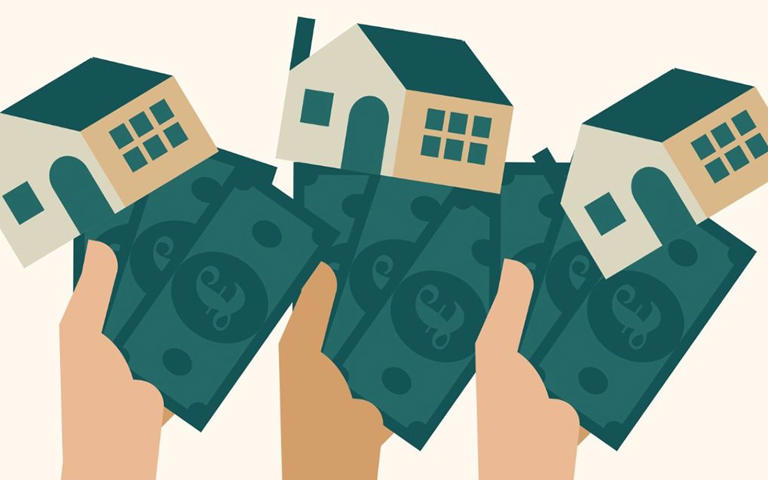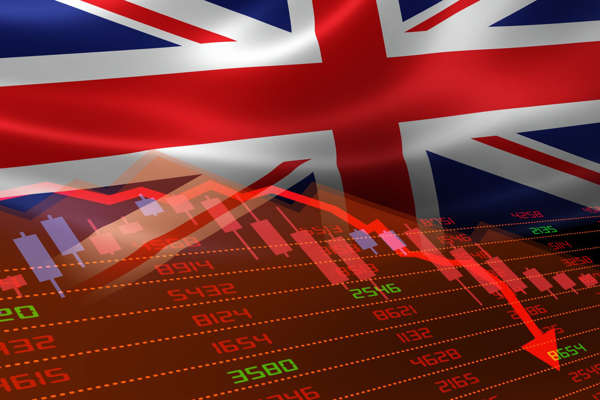The risk of a recession striking the UK is gathering pace experts warned today as still extremely high inflation and collapsing confidence has resulted in the economy going from “bad to worse”.
Swelling costs squeezing margins are forcing businesses to cut back production, while higher prices are eroding consumers’ incomes, knocking spending. Those two factors are squeezing output, pushing business confidence to minus 23.4 points, the lowest reading since 2009, according to the Institute of Chartered Accountants in England and Wales (ICAEW).
Suren Thiru, economics director at ICAEW, said: “These findings suggest that the economy went from bad to worse at the end of last year. The drop in confidence largely reflects the lethal combination of sky-high inflation and deteriorating customer demand that many firms are struggling to grapple with.”
Consumer inflation has raced to a 40-year high over the last year and is now running at 10.5 per cent, more than five times the Bank of England’s 2% target. While it is expected to gradually fall over the course of this year, wages failed to keep pace with price rises in 2022, a dynamic that is expected to continue this year. The ICAEW’s data indicated inflationary pressures are still strong. Both input and output are running at record highs.
As a result, households are forecast to wipe out non essential spending to protect their budgets, which, in combination with higher costs, will squeeze businesses’ finances. The UK economy likely missed a recession at the tail end of last year, with ONS figures revealing GDP climbed 0.2% in November. As a result, December output would need to drop at least 0.4% for the country to meet the technical two back-to-back quarters of contraction recession definition.
But, PMIs this week revealed the private sector economy is shrinking at the quickest pace in two years. The rate of profits growth has already slowed to 4.3%, and the ICAEW said this is deterring firms from investing.
Britain has among the lowest rates of business investment in the OECD, a trend that is likely to continue due to the Bank’s nine successive interest rate hikes to 3.5% tame inflation making it more expensive to borrow to fund capital projects. Figures from the Federation of Small Businesses (FSB) paint a similarly bleak picture.
Optimism among small firms in the final months of last year tumbled to its lowest level since the teeth of the Covid-19 crisis when large swathes of the economy was shut down, down to minus 46 points from minus 36 points in the previous quarter. Martin McTague, the FSB’s chair, called on chancellor Jeremy Hunt to set out more detail on how the government plans to lift the UK economy out of its more than decade long growth malaise. “Clearly, falling consumer spending, inflation, and high energy bills are all taking a toll, and poor results after the golden quarter are particularly disappointing – but this should also be a time to grasp the nettle and be decisive in finding more ways for the economy to grow, which is why we have drawn up a plan of action for the Government to implement,” he said.

UK recession: How jobs, mortgages, and more will be affected as forecasts worsen
The looming UK recession is likely to be much deeper than previously forecast, analysts believe. Reduced energy bill support from the Government, additional taxes on high-earners and a sharper slowdown in house price growth than anticipated means the recession could be twice as bad as experts had thought, according to economic forecasters at accounting and consultancy firm EY. It is still unclear whether the UK is already in recession, but economists broadly agree that is where the country is heading, if it is not there already.
Here’s what experts believe will happen to the economy this year, and what it means for you and your money.
What is a recession – and are we in one at the moment?
Perhaps surprisingly, there is no single universally agreed upon definition of a recession. At its core, a recession is a significant, widespread, downturn in economic activity lasting months or even years. The most commonly accepted definition of a recession is when the economy experiences at least two consecutive quarters (totalling six months) of economic contraction – or “negative growth”– in Gross Domestic Product (GDP).
In November, the Bank of England warned the UK stood on the brink of the longest recession in 100 years. It predicted this recession would begin before then end of 2022 and last for around 16 months. But GDP unexpectedly rose 0.1% in November, the Office for National Statistics announced earlier this month. Still, economists are braced for country to be plunged into a recession this year, and at this stage it looks inevitable.
How bad will this impending recession be?
Worse than previously predicted, according to the latest forecasts from EY. In October, its economists predicted a 0.3% contraction in GDP in 2023, followed by two years of growth at 2.4% in 2024 and 2.3% rise in 2025. Now, in an updated forecast, it has amended those figures, and predicts GDP will slump by more than twice as much this year, falling 0.7%. Growth in 2024 and 2025 has been downgraded to 1.9% and 2.2% respectively.
What does this mean for me and my money?
These figures seem quite abstract when we think about GDP, but they also stand to have a significant effect on our household budgets and our life choices. The worst case scenario makes for grim reading: ultimately more job losses will be on the cards. A shrinking economy goes hand in hand with higher rates of unemployment because, when consumer demand drops, businesses must react. They often do so by cutting back on staff numbers.
What about my mortgage?
The Bank of England is expected to raise interest rates by another 0.5 percentage points next month in what will be its 10th consecutive hike in rates as it battles to fight inflation. Currently that figure stands at 3.5% In 2020, the Bank of England slashed interest rates to a historic low of 0.1% but since January 2021, that figure has hurtled upward. Known as the “base rate”, this is the interest rate that the Bank charges other banks and lenders when they borrow money. The base rate determines the rate at which high street banks and lenders will charge consumers and businesses when they in turn borrow money.
Ultimately, rising interest rates make borrowing more expensive. When businesses have to pay more to borrow, they will typically raise prices to cover that cost – meaning everything from your grocery bill to clothing becomes more expensive. A mortgage loan is probably the largest loan most of us will ever take out. For people on fixed-rate mortgages, interest rate rises will not affect your payments as your payments are locked in for an agreed period. However, a standard variable rate usually follows the Bank’s base rate movements – so if you are on this type of mortgage you will see an increase to your payments. The same goes for those on tracker rate mortgages.
Is there any bright side to all of this?
There is one small positive at risk of being overshadowed, Hywel Ball, EY’s UK chair, suggested. "While the economic outlook is decidedly more “gloomy” than analysts had thought, and the UK may already be in recession, there is a “one silver lining, despite being a deeper recession than previously forecast, it won’t necessarily be a longer one. The economy is still expected to return to growth during the second half of 2023 and has been spared any significant new external shocks in the last three months from energy prices, Covid-19 or geopolitics, and inflation, which has soared and remained stubbornly high “may be starting to retreat, while energy prices have also dipped," Mr Ball said.
When will inflation drop to a more manageable level?
EY said it expects inflation to average 7.2% this year. While this is high by historical standards, “it is likely that we’ve already passed the peak with inflation reaching 11.1% last October”, the firm said. It predicts inflation will tumble to around 4 by the end of this year, as a fall in commodity and shipping prices filters down to consumers, and wholesale gas prices also come down.

How a house price crash will crush retirement dreams for millions
Ahouse price crash risks “crushing” homeowners’ long-term finances, as those banking on property wealth in retirement will see their later life resilience fall seven times further than those who rent, new analysis shows. The bigger the fall in house prices, the more significant the projected damage to retirement financing, as those who hoped to release equity from their homes to fund later life see their potential returns tumble.
Experts warn that retirees must be prepared to accept that they will not have the funds for the lifestyle that they had hoped for. Modelling the impact of a house price crash scenario, where prices fall by 18pc, investment firm Hargreaves Lansdown found that average later life resilience – the extent to which working-age households are on track for a moderate retirement – among homeowners would drop seven times further than renters in the coming year.
Although homeowners have a stronger later life resilience score than renters, house price falls will strike a much more severe blow to their long-term financial prospects, spelling further gloom for those who have already had to contend with mortgage rates skyrocketing and other rising living costs.
Sarah Coles, of Hargreaves Lansdown, said: “House prices are heading for a fall in 2023, which risks crushing our finances. People with mortgages will still be reeling from the short-term blow of higher interest rates when they’re hit with the horrible news about the damage to their long-term financial resilience.”
Gary Smith, of Evelyn Partners, told The Telegraph: “For a lot of people, part of their retirement strategy is to downsize or enter into equity release to supplement the state pension and any other pension they’ve built up, so this will definitely impact upon their retirement plans, and the lifestyle that they hope to have might not necessarily be what they've planned for as a result of falling house prices.”
One in seven of those over the age of 50 will be forced to sell up or release equity from their homes as a result of the cost of living crisis, according to the LiveMore Barometer, an indicator of the financial priorities of older people. For the 15% of those surveyed by LiveMore, a lender for the over-50s, saying that raising more cash to live on by downsizing or releasing equity was their top financial priority, precipitous falls in house prices would lead to ever-diminishing returns.
Capital Economics has forecast a house price fall of 12% this year, with Halifax proposing a more conservative estimate of 8%.
The recent findings were found as part of the Hargreaves Lansdown Savings & Resilience Barometer, which measures financial resilience out of a score of 100. The current average resilience score for later life planning is 49.1 out of 100 - but a house price crash would see a drop of 1.4 points among homeowners, compared with 0.2 points for renters.
The average fall in the score of Gen Z and Millennial homeowners was almost three times steeper than that of their Baby Boomer counterparts - down 2.2 points compared to 0.8.
Mr Smith said that many may consider opting out of workplace pension schemes in order to increase their income quickly to meet urgent living costs, with their later life financing taking a further hit. He said: “For those on the pre-retirement route, so those who are accumulating wealth, their ability to save through rising mortgage costs and the cost of living means that it puts pressure on their ability to save towards their pensions and how much they can put away. You might find that some people opt out of workplace pension schemes to effectively increase their income to cover the rising cost of mortgage costs and cost of living. Lower earners and middle earners might actually see their pension in retirement savings reduced, whilst they redirect finances to meet other more immediate costs, which obviously has an impact in retirement because you have less saved towards your retirement.”
Mr Smith urged workers to avoid opting out of pension schemes “where possible”, but acknowledged that many would therefore have to consider delaying retirement by two or three years.
Ms Coles added: “The Barometer shows that if house prices were to fall 18pc, later life resilience would drop seven times more for homeowners than for renters in the coming year. This owes much to the fact that in order to get a rounded picture of people’s retirement income and outgoings, the Barometer looks at home ownership - and how much equity people have in their home, alongside pension savings and other assets. “The idea is that the less equity you have when you get to retirement, the more you’ll need to pay to keep a roof over your head. “Times are increasingly tight for homeowners, who face falling savings, rising debt, and an increasingly uncertain long-term future. If your mortgage is set to rise, it’s essential to take stock and work on cutting your costs, to help protect your savings and stave off debt. If you’re tempted to change your mortgage arrangements to bring prices down – by switching to an interest only mortgage for a period, or extending the term, you need to consider all your options, and the impact it will have on when you can afford to retire.”

